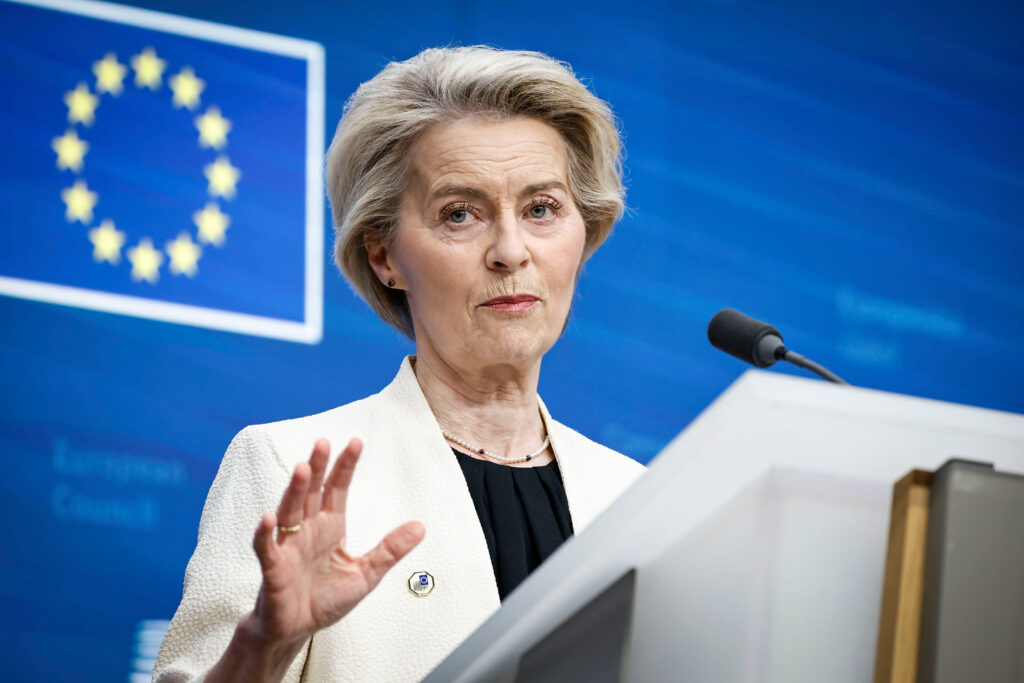Interviews / Climate, Environment, Security
3 June 2025
European Climate Commitments: A Change in Direction?

Although a pioneer in the fight against climate change, the European Union is now initiating the dismantling of its green legislative framework. Under the guise of “simplification”, backed by European industrial groups, several measures are being revised and directives guiding their implementation are being relaxed, to the detriment of their effectiveness. At a time when Donald Trump is disengaging from environmental policy, this global trend towards “easing constraints” could have serious consequences and jeopardise the attainment of stated objectives. What are the reasons behind this European disengagement and how is it taking shape? How does the Commission justify this dismantling process? An update from Mathilde Jourde, researcher at IRIS and head of the Climate, Environment and Security Programme.
In recent months, we have observed a general downward trend in climate commitments, particularly in the United States. Is this trend also evident in the European Union?
Since Donald Trump came to power in January 2025, criticism has mainly focused on the United States, where the administration has adopted almost a hundred measures aimed at dismantling the country’s environmental and climate policy. However, a comparable process is underway in Europe. Far from the overt climate scepticism of Donald Trump, this European ecological retreat is manifesting in a more subtle way. It is no less worrying, as it is leading to the gradual dismantling of climate regulations and, more broadly, the European environmental policy, which was initially ambitious.
Historically, the European Union (EU) has positioned itself as a key player in the fight against climate change. A signatory as early as 1992 to the United Nations Framework Convention on Climate Change (UNFCCC), and a party to the Kyoto Protocol in 1997, it committed to the Paris Agreement in 2015. Building on this commitment, the Commission launched the European Green Deal in 2019, a strategy aiming to achieve carbon neutrality by 2050. Since its adoption, this Green Deal has resulted in a series of directives and regulations intended to ensure its concrete implementation by Member States and companies.
This Green Deal is now being progressively dismantled in the name of “simplification”, a stated priority of Ursula von der Leyen for her second term (2024–2029). In the same vein, the Draghi report of September 2024 also recommended “simplifying” the European regulatory framework, notably targeting sustainability regulations deemed too restrictive for businesses. The Budapest Declaration of November 2024 on the new pact for European competitiveness set a target to reduce corporate reporting obligations by at least 25%.
Thus, in February 2025, the European Commission adopted the Omnibus I package, a legislative initiative grouping together several text amendments under a single proposal, specifically targeting sustainability regulations. This package targets three flagship Green Deal measures: the Corporate Sustainability Reporting Directive (CSRD), the Corporate Sustainability Due Diligence Directive (CSDDD), and the taxonomy guiding investments towards sustainable activities. The CSRD, originally intended to apply to around 50,000 companies, will now cover only 10,000. The due diligence obligation under the CSDDD remains in force but is now limited to direct suppliers, whereas it previously covered entire value chains. Finally, taxonomy reporting requirements have been eased, reducing data provision by around 70%.
What are the reasons for this European shift?
Political support for this Omnibus law, which reflects a general trend also seen in the United States, mainly stems from internal pressures. Although Donald Trump and Elon Musk have repeatedly criticised European regulations, calling them “very unfair to the United States, and very bad”, this deregulation is primarily the product of a sustained lobbying campaign by major European economic players.
European employers’ organisations such as the Mouvement des entreprises de France (Medef), the Bundesverband der Deutschen Industrie (Federation of German Industries or BDI), Confindustria (Italy) and Business Europe (European Union) have actively campaigned for this deregulation. According to a study by Reclaim Finance, 70% of the demands included in the letter signed by Medef, BDI and Confindustria were incorporated into the legislative proposal presented by the European Commission. Companies also exerted direct pressure, such as the ACEA (European Automobile Manufacturers’ Association), which advocated for the relaxation of certain measures, including the ban on the sale of combustion engine vehicles by 2035.
These influence strategies are also playing out at national level, as illustrated by Emmanuel Macron’s 2023 call for a European “regulatory pause”. In May 2025, this deregulation dynamic also led to a series of environmental setbacks in France, such as bypassing parliamentary debate on the Duplomb law – which reinstates certain pesticides, facilitates the deployment of megabasins, and allows the expansion of industrial farms without environmental impact studies – the resumption of work on the A69 motorway, and the removal of Low Emission Zones (LEZs). These deregulations thus illustrate the success of private sector influence strategies.
What arguments are put forward? Are they valid?
The rhetoric justifying this deregulation highlights the need to “simplify” standards, reduce administrative “red tape”, and ease burdens on businesses in the name of “competitiveness”. International competition and the geopolitical context are frequently invoked to justify this simplification.
However, this rhetoric, which pits pragmatism, competitiveness, sovereignty, and profitability against sustainability and human rights, is based on a biased vision. Several arguments challenge it. In the short term, these regulations serve as a differentiation lever from the United States and enhance the European Union’s credibility in climate diplomacy. These standards also help protect European businesses against international competition, particularly from the US and China, whose companies are not subject to the same requirements, as evidenced by the Carbon Border Adjustment Mechanism (CBAM). In the medium term, the CSRD, with its principle of double materiality, also enables companies to better anticipate future risks and reduce their vulnerability to climate hazards. Finally, in the longer term, abandoning these regulations is also questionable. China is drawing on the European CSRD to develop its own non-financial reporting framework. A withdrawal by the European Union from these standards could, in the medium to long term, lead to restricted access to the Chinese market, thereby undermining the EU’s commercial position.
Moreover, the rhetoric of simplification is also misleading. If the current trend were truly limited to simplifying administrative procedures, it would likely not provoke such criticism. The principle of simplification is indeed recognised as beneficial by all stakeholders, insofar as it aims to improve the clarity of standards, facilitate data collection and enhance the effectiveness of existing mechanisms. It was in this spirit that the Mouvement Impact France, representing entrepreneurs committed to the social and ecological transition, advocated for “balanced simplification”. However, in the current context, the term “simplification” instead denotes a deregulation process that empties key instruments of the European Green Deal of their substance, as shown by Emmanuel Macron’s statement at the Choose France summit on 20 May 2025, where he declared that “the CS3D and a few other regulations should not just be postponed by a year, but discarded”.
This rhetoric appears all the more paradoxical given that many companies support and recognise the economic and social value of these regulations. A pan-European survey conducted by the #WeAreEurope collective, in partnership with HEC Paris, revealed widespread corporate support for the CSRD directive and significant concern about the direction taken by the Commission’s simplification efforts. Conversely, companies primarily need regulatory stability and predictability, rather than frequent changes of direction, as highlighted in a February 2025 op-ed signed by 240 researchers and economists.
This reversal marks a major ideological shift by the European Union, which, since the 1990s, had established itself as a pioneering actor in environmental policy. While this position could have been strengthened with Donald Trump’s arrival in 2017 and again in 2025, the current trend is moving in the opposite direction, as further waves of simplification are planned for 2025.

